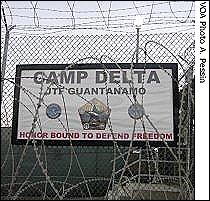2007年VOA标准英语-Enemy Combatant Tribunals Raise New Questions o(在线收听)
Washington
22 March 2007
On March 26 Australian terror suspect David Hicks will become the first detainee held by the United States to be tried in the new military commissions created by the Bush administration. The U.S. government says it intends to use the commissions to try up to 80 detainees on war crimes charges. As VOA Correspondent Gary Thomas reports, the military tribunal system has again raised questions about U.S. legal and physical treatment of terrorist suspects.

Sign at entrance of Camp Delta
Before any formal military trial, detainees appear before an Enemy Combatant Status Review Tribunal, a panel of military officers that determines if the detainee is to remain in confinement. But the convening of the panels and upcoming military trials has resurrected questions about how the U.S. is dealing with suspected terrorists.
On March 9, Khalid Sheikh Mohammad was the first of 14 high-value detainees to face a status review tribunal. The 14 men were transferred to a prison at the U.S. base at Guantanamo Bay, Cuba from secret CIA facilities abroad in September to comply with new U.S. government rules on the handling and treatment of detainees.
A confidential report by the International Committee of the Red Cross, leaked to the Associated Press, quotes all 14 high-value detainees as saying they have been mistreated while in CIA custody.
In his hearing, Mohammad, who confesses to a major role in 31 terrorist plots, including the September 11, 2001 attacks in New York, also claims to have been tortured by CIA interrogators. But further information on his allegations was edited out of the transcript released by the Pentagon. David Hicks also claims to have been tortured.
Former British counter-terrorism officer Tom Parker says claims of torture undermine any confession such as the one made by Mohammad.
"It may or may not be true. But the bottom line is, because we do not know how he was treated, we do not know the techniques he was subjected to, and indeed, if he has been subjected to techniques beyond the traditional law enforcement tools, it has to discredit what he says," said Parker. "And the fact that it comes so long after he has been held incommunicado, whether it is true or not becomes almost beside the point. Clearly the credibility of his confession is vastly reduced. It is almost nil."
Mohammad was captured in the Pakistani city of Rawalpindi, near the capital Islamabad, in 2003.
White House spokesman Tony Snow flatly denies that the detainees were tortured in U.S. custody.
"The policy of this government is that we do not engage in torture. There are very specific guidelines that have been laid down in terms of the questioning of people who have in fact been in U.S. custody," said Snow.
Former CIA officer Michael Scheuer, who once headed the unit hunting Osama bin Laden, says Mohammad and his fellow detainees may be making claims of torture as a form of psychological warfare against the United States.
"It is very clear that he is very cognizant, for example, of the debate over the propriety of using enhanced interrogation techniques, of running a place like Guantanamo," he said. "It is very clear he is trying to cause the United States problems with the Europeans and with human-rights people by claiming he was tortured, by claiming that a large number of the people at Guantanamo really have not done anything wrong. It is really a very, very sophisticated performance by a man whose English is not all that great, really."
Besides condemning the allegations of torture, human-rights groups such as Amnesty International have also urged the United States to abandon trial by military commission because legal standards are less stringent than those of U.S. civilian courts.
Former FBI agent Jack Cloonan was on the counter-terrorism squad in the New York field office. Cloonan says in light of Mohammad's confession before the status review panel, it would be better if he and the other terrorist suspects were tried in regular courts.
"I am not finding fault necessarily with the military tribunals, the commissions that will ultimately determine his fate," said Cloonan. "But I think for all of us and the rest of the world that is going to look at this, we would be much better served by having this in a U.S. federal district court, rather than having a military tribunal. There will be a cloud hanging over this, despite his having elocuted [spoken] over this and pleaded to these 31 different episodes. I would much rather have him in a court of law, defended by counsel, rather than this."
David Hicks, an Australian, has pleaded not guilty to a single charge of providing material support for terrorism. Other charges, including attempted murder and aiding the enemy, were dropped.